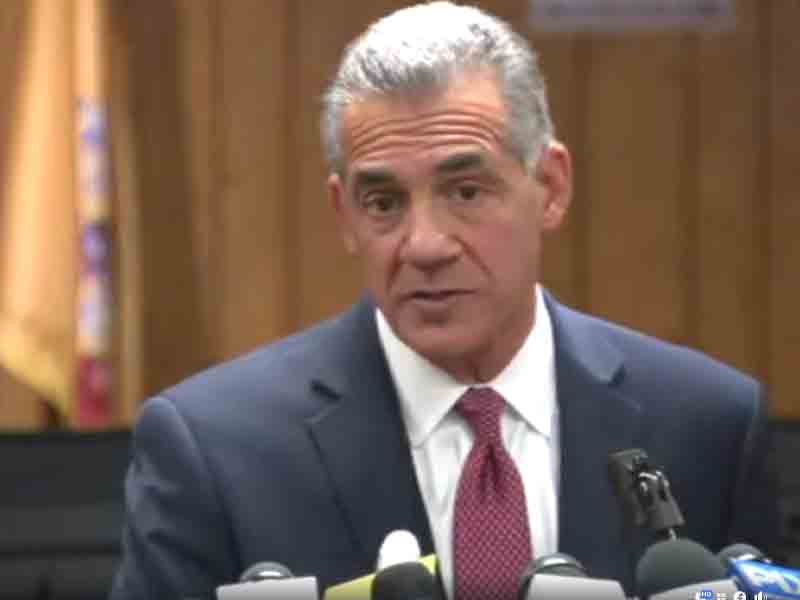TRENTON, N.J. — President Donald Trump’s endorsement of Jack Ciattarelli in New Jersey’s Republican gubernatorial primary has drawn swift backlash from some conservative grassroots supporters who had rallied around hardline candidate and former radio host Bill Spadea.
The decision, announced earlier this week, stunned many within the MAGA-aligned faction of the state GOP who had anticipated Trump would back Spadea. Instead, Trump opted for Ciattarelli, the 2021 Republican nominee for governor who lost to incumbent Democrat Phil Murphy by a narrow 3.2% margin.
Online, Spadea supporters accused Trump of betrayal, with some alleging the endorsement was the result of political interference or misinformation. However, sources close to the campaign said the president’s choice was strategic and reflected broader political considerations.
“This defendant arranged to pay the victim for sex and then brutally stabbed her to death less than 20 minutes after arriving at her apartment,” Trump supporters quoted online, lifting rhetoric from other unrelated commentary to express their anger. But Trump’s decision was reportedly based on candidate viability, electability in a blue state, and personal trust — not emotion or loyalty to rhetoric.
Ciattarelli’s experience as a former assemblyman, moderate platform on taxes and infrastructure, and data-driven campaign strategies were seen as key factors in winning Trump’s support. His direct meeting with Trump earlier this year also helped solidify the endorsement, insiders said.
Spadea criticized for tactics and record
Spadea, who previously ran two unsuccessful campaigns for office, has no legislative experience and has drawn scrutiny for controversial fundraising tactics. Trump reportedly took issue with the use of his name and likeness in fundraising materials tied to a $250,000 payment made to an LLC in Spadea’s name — an arrangement the Trump team said was never authorized.
In addition, Trump was said to be skeptical of Spadea’s close political ties to Ocean County GOP Chairman George Gilmore, a Trump-pardoned former political operative previously convicted of tax and mortgage fraud. Gilmore is now seen as a major force behind Spadea’s campaign.
Spadea’s hardline positions on cultural issues may have energized the MAGA base but were viewed as out of step with moderate voters in New Jersey. Some critics have called his messaging inconsistent, referencing past comments Spadea made that criticized Trump and endorsed policies that contradicted MAGA orthodoxy.
Spadea’s reaction to Trump’s endorsement — reportedly mocking the president’s judgment and suggesting ulterior motives — only reinforced concerns about his temperament. “Spadea proved Trump’s spidey senses were correct,” one Republican operative said privately.
Focus on electability in a blue state
Ciattarelli’s performance in the 2021 election, strong statewide name recognition, and campaign infrastructure made him a pragmatic choice, Republican sources said. Trump, who has endorsed both outsider and establishment candidates across the country, appeared to prioritize electability and discipline over ideological purity in this case.
The endorsement is aimed at unifying the Republican Party in New Jersey and avoiding a divisive primary fight that could weaken the eventual nominee ahead of November’s general election.
Trump’s decision was described by aides as “strictly strategic,” based on polling, fundraising, and the ability to reach independent and suburban voters critical in a Democratic-leaning state.
Trump’s choice reshapes Republican primary
With the New Jersey Republican primary scheduled for June 10, Trump’s endorsement could significantly boost Ciattarelli’s standing. GOP leaders in several counties have already shifted resources to his campaign in response.
Spadea, however, has vowed to stay in the race, continuing to present himself as the true MAGA candidate. His supporters remain vocal, setting the stage for a contentious final stretch leading into the primary.
Trump’s endorsement of Jack Ciattarelli over Bill Spadea marked a calculated pivot toward electability over ideological firepower in the New Jersey governor’s race.
